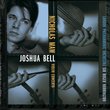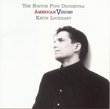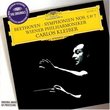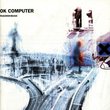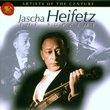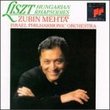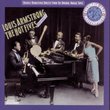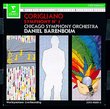| All Artists: Franz Liszt, Seiji Ozawa, Boston Symphony Orchestra, Krystian Zimerman Title: Liszt: Piano Concertos Nos.1 & 2; Totentanz Members Wishing: 0 Total Copies: 1 Label: Deutsche Grammophon Release Date: 10/25/1990 Genres: Dance & Electronic, Classical Styles: Forms & Genres, Concertos, Instruments, Keyboard Number of Discs: 1 SwapaCD Credits: 1 UPC: 028942357129 |
Search - Franz Liszt, Seiji Ozawa, Boston Symphony Orchestra :: Liszt: Piano Concertos Nos.1 & 2; Totentanz
 | Franz Liszt, Seiji Ozawa, Boston Symphony Orchestra Liszt: Piano Concertos Nos.1 & 2; Totentanz Genres: Dance & Electronic, Classical
![header=[] body=[This CD is available to be requested as disc only.]](/images/attributes/disc.png?v=15401716) ![header=[] body=[This CD is available to be requested with the disc and back insert.]](/images/attributes/disc_back.png?v=15401716) ![header=[] body=[This CD is available to be requested with the disc and front insert.]](/images/attributes/disc_front.png?v=15401716) ![header=[] body=[This CD is available to be requested with the disc, front and back inserts.]](/images/attributes/disc_front_back.png?v=15401716) |
Larger Image |
CD DetailsSimilar CDs
Similarly Requested CDs
|
CD ReviewsEssential Lisztening!! Paul Rossi | Walla Walla, WA | 07/26/2002 (5 out of 5 stars) "After listening to this CD repeatedly, I feel compelled to share my thoughts and responses about the outstanding performances of Krystian Zimerman and Seiji Ozawa. To open Liszt's Piano Concerto No. 1, the orchestra gives a first-rate opening to usher in Krystian Zimerman. What follows is truly extraordinary! Zimerman plays the runs with a power that does not exceed beauty. Every note in his runs rings with clarity. Zimerman's sense of rhythm is impeccable, and he plays the soft sections with great sensitivity and poetry. However, Zimerman also uses a sort of muscular playing for the louder, more aggressive playing, but it is not like the sometimes overly muscular playing of pianists like Horowitz or Argerich. Zimerman belongs to the class of self-effacing pianists like Radu Lupu and Murray Perahia who use their brilliant pianism to communicate the composer's intentions poetically.The second concerto is full of the same graceful effort and attention to detail and poetry. Zimerman, Ozawa, and the Boston Symphony Orchestra create a nostalgic mood that escapes words. The stretto to end the concerto is brilliant and full of amazing energy!However, I believe that the most impressive performance among those on this CD is that of the Totentanz. This is Zimerman at his most ferocious and virtuosic. He thunders away to open the Totentanz, and then he gives full attention to the urgent runs up and down the piano. Everything Zimerman does sounds terrific and makes so much sense musically. The virtuosity is incredible, and the orchestra is thrilling. The second-to-the-last variation is absolutely mind-blowing and sends chills up and down my back and arms!!In short, this CD, I believe, is the definitive set of these works. Sviatoslav Richter gives performances of the Liszt Concertos which closely rival Zimerman's, but I have to give Zimerman pride of place even over the legendary Richter!!Other recommendations: Ravel Piano Concertos (Zimerman/Boulez), Liszt Symphonic Poems (Michael Halasz on Naxos), Liszt Transcendental Etudes (Claudio Arrau--Philips or Lazar Berman--Melodiya BMG)" They never quite take this music *far* enough John Grabowski | USA | 09/22/2002 (3 out of 5 stars) "These are surprisingly ordinary musical interpretations, though they are--typically today--beautifully played and recorded. But they say nothing new about either concerto. The agitated opening of the First, for example, is not as agitated as it could be or as I think it should be. And of course with Zimerman at the keyboard there is virtuosity, but he doesn't feel to me as though he's really pushing himself. These concerti, like much of Liszt, were "far out" for their day, pushing the genre farther than anyone since Beethoven. (In fact, the E-flat extends many of the ideas Beethoven had in his last concerto, also in E-flat.) This music calls for living on the edge. I don't mean just sound and fury. I mean expressive *and* structural discoveries, for these works have a structural integrity and complexity not always acknowledged by many detractors. Throughout these performances I feel like Oz and Zim are holding back, and should give more. There's a curious detachment, and it doesn't serve the music.Take the second part of the Second Concerto, labeled Allegro agitato assai. It's not agitato enough to my ears. The strings do not bear down hard enough with their bows. The tympani sounds muffled, soft. The following movement, which brings us down to earth following the heaven-storming of the previous one, does not bring us very far. It's not all that tender and lyrical, despite, or maybe because of, lots of heavy vibrato. It's as if they're faking it. Contrast Richter/Kondrashin on Philips for a thrilling ride, with a savage, slashing opening movement (that at the same time never gets away from the players), and a lyrical second movement of unearthly beauty. It would take too much space here to give many A-B examples like that, but another is the trill leading into Allegretto vivace in the First Concerto. When Zimerman plays it it's just a trill. When Richter plays it, and Kondrashin accompanies him, it's so tactile you can almost feel it, "hushed pianissimo." By barely touching the keys, Richter manages to bring forth the most delicate sound, somewhere between glass and air. This extreme, coming on the heels of the heaven-storming previous movement (where they shake up the joint much more than Zimerman/Ozawa) just makes for gooseflesh on the arms. Kondrashin has a better grasp of the structure too, phrasing parts to remind you of a connection earlier or later in the piece with another line, for example. You can really hear the interconnectivity between movements and within movements. By contrast, the present recording is on the whole little more than perfunctory, with everyone playing THE NOTES but adding little more to the reading. (The exception is Charlie Schleuter, who adds a loud and overly-bright first trumpet that occasionally goes sharp in loud passages.)If these were obscure pieces of I'd recommend this disc without hesitation. It's all generally well-played and well-recorded. (I'm another one who doesn't hear those "obvious problems" in the loud passages, even when following the score and listening on Grado audiophile headphones.) But these are warhorses--or certainly the first is--and why go with this average recording in a crowded field of extraordinary performances that bring more performer insight to the music? One of those extraordinary recordings is the Richter/Kondrashin. There are others too. You wouldn't go wrong by buying this disc, but you wouldn't get a particularly interesting performance, comparatively-speaking, either." The best Kyle Cronin | Troy, Michigan United States | 01/10/2002 (5 out of 5 stars) "I don't know what could possibly keep this CD from a 5-star rating. The first review below claims huge glitches in the soundtrack...uh, there are none. And I hear no loud passages in which "mistakes have obviously been made" either. It's probably just a Richter fan disgruntled because this recording is so good. I mean, come on people! This is a digital recording of Krystian Zimerman, the master of technical prowess, made by Deutsche Grammophon, one of the absolute best record labels. That's like claiming the Detroit Symphony Orchestra's recordings have huge mistakes in the playings...it's just not plausible. ...This is by far my favorite recording of the piano concertos of Liszt. The sound quality is fantastic, with no audible "hissing" or glitches in the sound. His interpretation of the music is simply so much more interesting than any other that I've heard that there's no comparison. For example, at the end of the cadenza a short way into the first movement of the first concerto, he rushes the last few chords. I've never heard any other pianist do that, but it has great effect. From the austere moments to the glimmering, he plays with style Lisztian enough to satisfy whatever any Liszt lover could want. I highly recommend this CD."
|

 Track Listings (8) - Disc #1
Track Listings (8) - Disc #1
